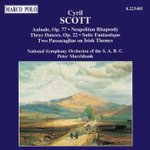|
Back
04/23/2016
Cyril Scott: Aubade for Large Orchestra, Opus 77 – Two Passacaglias on Irish Themes – Neapolitan Rhapsody – Three Symphonic Dances, Opus 22 – Suite Fantastique
National Orchestra of the S.A.B.C., Peter Marchbank (Conductor)
(1994) – 73’
Marco Polo # 8.223485 – Liner notes in English

   
At an earlier age, Cyril Scott was deemed a turn-of-the-century British counterpart to French impressionism, particularly Claude Debussy. But in a forward climate, his stylization became more modernized, daring and acerbic, especially while being absorbed with occultism and holistic medicine. Certainly not an illuminated beacon inside annals of classical music, his music in the past has not been taken that seriously until now. The public is reconnecting with Scott’s inventive music, offering a potpourri of flavors.
In particular, two selections, are striking. The first is the Aubade for Large Orchestra (1911) that musically lives up to its Webster definition: a morning song depicting lovers’ departure at dawn. However, the opening bars present an ironically nocturnal cadence bearing Debussy’s Les Parfums de la nuit (1905-1908) with its flickering exoticism and ambiguity. Shortly thereafter we hear a capricious shifting of gears to pastoral flights glancing at Frederick Delius. Scott cleverly used a five-note purloined motif to help develop hints of Richard Strauss and Alexander Zemlinsky. Even though the middle section becomes boisterous, the composition’s general feeling evokes a mesmerizing journey of bleeding emotion and swelling optimism with its platonic ending well echoing Delius’ In a Summer Garden (1908).
Secondly and equally impressive, is the revised Three Symphonic Dances, originally performed and titled as the Symphony No° 2 in A minor. Undoubtedly, Scott’s second movement, “Andante sostenuto e sempre” caters to lush and sweeping English romanticism with its pleasing resolves. The South African Broadcasing Corporation (S.A.B.C.) Orchestra sparkles with beautiful harp glissandos and windows of patiently snowballing crescendos that nudge at Glazunov dynamics. This contrasts nicely with a more verismo Pucciniesque quality sonata-driven formation found within the “Allegro con brio”; the final “Allegro energico” is pleasant enough though tossed around with harmonic restlessness.
But it wasn’t until 1912 when Scott wrote his Two Passacaglias on Irish Themes that he defined himself as a true composer. Not particularly noteworthy, it deserves a comment or two. Inside, we hear patterned variations on a contemporary twist with a direct note quote sequence aligned to the miners’ theme found inside Puccini’s La fanciulla de West (1910) alongside the “Sostenuto” housing menacing “Gnome” mimicries from Pictures at an Exhibition (1874). The youngest of compositions, Neapolitan Rhapsody, shows Scott at his abstract best: there’s nothing in the music that conjures images of Naples, and the commentary simply rambles.
Written for small orchestra, the Suite Fantastique could be likened to an astringent symphonie chorégraphique version of Ravel’s Daphnis et Chloé that cultivates the story of Morgan le Fay, sister to legendary King Arthur. Marchbank’s rumbling lower strings (“Fata Morgana”) nicely cultivate the essence of a spirit deeply embedded in the bottom of a lake. In the “Fire Dance” we find Scott’s use of tambourines as the foundational instrument alongside the fleeting oriental-like energy. “Dance of the Spectres” retains an eerie uncertainty with softened harp runs while “Goblins and Elves” elicits an incorporeal visage with rumblings grounded by the S.A.B.C.’s lower registers.
Even though this 1994 recording was never enhanced, it, nonetheless, provides sufficiently pleasant acoustics despite blanketed fallow richness; the strings’ are occasionally pallid. A handful of other albums exist, but this Marco Polo release features some of Scott’s more rarified compositions, and it is worth a visit if one dares to reach beyond the Anglican repertoire.
Christie Grimstad
|